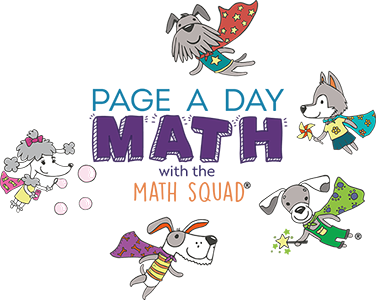
How To Teach Math To Preschoolers & Kindergarteners - Parent Guide by Page A Day Math
Your preschooler or kindergartener may not be able to read and spell yet but you still read to them, right? Similarly, just because your preschooler has not mastered addition and subtraction, you should still do math with them. Studies have shown that early math skills are an innate ability, and that babies as young as six months can tell when an item has been taken away (subtraction!).
It's up to us as parents to foster that innate ability and introduce math in a way that’s fun and relates to our everyday lives. We’ve mentioned before that there are only 58 seconds of math included in the average six-hour preschool day. Less than a minute of math time is not enough to foster interest and curiosity.
So, you’re ready to teach your preschooler some math! But how? Here are some tips and suggestions to get you started.
Make Math Fun
Sometimes when people hear me say that I encourage parents to do math with their young kids, they imagine I mean math drills and long lessons. That is not what I mean. Math should be fun! From pointing out math while you’re reading to measuring ingredients as you bake cookies—math can be part of a lot of the fun things you are already doing.
Here are ten easy, fun ways to bring math into your preschooler’s everyday activities.
- Read books that incorporate math. I’m not talking about an introduction to algebra. I mean something like The Very Hungry Caterpillar. How many apples did he eat on that day? Let’s count them! Just about any children’s picture book can be used for math. How many people do you see in this picture? How many of them have black hair?
- Baking and cooking easily lends itself to talking about math. How many teaspoons of vanilla do I need? Help me count them. We need to double this muffin recipe in order to have enough for your friends. How many cups of flour should I use?
- Measure things! Have you ever given a child a measuring tape? It will make you feel silly for buying them toys at all. They LOVE them. How long is the couch? How long is your dresser? Which is taller, your bear or your tiger?
- Any kind of building block is a great math opportunity. How many blocks do we need to make the tower as high as the table? Use patterns while you build. Point out the different shapes of the blocks.
- Mealtimesare another easy time to add in some math. How many strawberries are on your plate? Who has more crackers, you or me? How many bites do you think it’s going to take to finish your hotdog?
- Nesting toys are a good way to give kids a visual for comparing sizes. Nesting cups can be fun during bath time. Which cup holds more water? Nesting dolls are fun, too!
- The grocery store is chock full of math learning opportunities! How many bags do we need for our vegetables? What shape is the orange? We need four lemons — could you help me count them? How much do you think these carrots weigh?
- Stuck inside on a rainy day? Use it to your advantage and track the weather! How many days this week have been rainy? Sunny? Cloudy? What is the temperature? Is that higher or lower than yesterday?
- Do your own math out loudso that your kids can see how it’s used in real life. When you are paying for groceries, looking for a less expensive item, or figuring out how many extra chairs you need when family comes over. All of these are opportunities to show your child how important math is in our lives.
- Use Page A Day Math! With its lovable cast of superheroes, the Math Squad, cheering your child along, Page A Day Math books are so much fun to use! Our colorful, child-sized books can help make math a positive, enjoyable part of your child’s day.
Page A Day Math was designed to provide a little bit of math every day in the way kids learn best. Just one page a day means it’s not overwhelming. A few minutes is all it takes, which can easily be fit into your schedule.
Page A Day Math books present new facts while continuing to review older ones, giving your child the amount of repetition needed to truly learn concepts. Plus, your child will get practice writing out numbers and equations each day. Not only does this help them learn, but they can go back and see how much their handwriting has improved. Completing books and seeing how much they have progressed gives kids a huge sense of accomplishment!
Make Math Part of Everyday Life
You don’t need to drop everything you’re doing and give your child a math lesson. In fact, it’s better to point out math in the everyday activities you already do. This helps to make math something that isn’t scary or overwhelming, it’s just part of your routine. It also helps kids see why math is important—you use it all the time!
Write It Out
Don’t just talk about math—write about it! Writing things down actually stimulates parts of the brain that aren’t activated when you’re just looking at or talking about something. Kids learn better when handwriting is involved. Just as your preschooler is learning to write letters and understand what they symbolize, have them write down numbers as well.


Repetition
I loved reading to my kids when they were little, but sometimes they wanted to hear the same story over and over again. Kids like repetition—it’s how they learn. This is true for math as well. You might feel like you’re talking about the same thing over and over, but that’s what’s going to help your child really understand concepts.
Does Early Math Really Matter?
We know that preschool-aged children are ready for math, but does it really matter if they get it now or after they start kindergarten? Yes! Research tells us that early education in STEM has many positive benefits, and not just within STEM subjects.
Early STEM learning promotes socio-emotional development in children and helps with later learning in all subjects. Early learning in math and science improves language development, literacy, reading comprehension, and writing skills. STEM learning is actually similar to language learning in that immersion as early as possible and in as many environments as possible leads to better learning.
Other studies have shown that early math skills are not only a predictor of future success, but are one of the best predictors. Kids who enter the school system with better math skills perform better and experience more success in fifth and eighth grades.
I think when parents hear someone say preschool math is important, they get nervous. There are a lot of adults out there that don’t like math. The idea that they should be teaching it to their young children feels daunting.
Think of it like you would think about reading to your child. You’re not diagraming sentences, you’re just reading together. Similarly, you’re not doing algebra, you’re pointing out numbers and patterns in your daily activities. Pretty soon it will become second nature, and your child can grow up loving math.
Are you ready to get started teaching math to your preschooler?
Click here to download our counting and numbers coloring book for free!


To try a sample math book from one of our math kits, click here.
Try our complimentary flashcards, click here.
__________________________________________________________
About the Author and Creator of Page A Day Math
 Janice Marks
Janice Marks
Janice began her career in education to pursue teaching pre-algebra at BASIS Tucson North, a charter school currently ranked as the sixth-best STEM school in the country by Newsweek. There she found joy in teaching math, working with parents, and inspiring children to believe in themselves and thrive. This experience, along with helping her own children succeed in math, led her to develop the Page A Day Math system.





